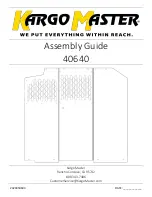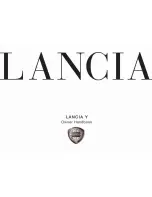
one year old and weigh at least 20 lbs (9 kg). Two types
of child restraints can be used rearward-facing: infant
carriers and
⬙
convertible
⬙
child seats. Both types of
child restraints are held in the vehicle by the lap/
shoulder belt.
•
The infant carrier is only used rearward-facing in the
vehicle. It is recommended for children who weigh up
to about 20 lbs (9 kg).
⬙
Convertible
⬙
child seats can be
used either rearward-facing or forward-facing in the
vehicle. Convertible child seats often have a higher
weight limit in the rearward-facing direction than
infant carriers do, so they can be used rearward-facing
by children who weigh more than 20 lbs (9 kg) but are
less than one year old.
•
Rearward-facing child seats must
NEVER
be used in
the front seat of a vehicle with a front passenger airbag
unless the airbag is turned off. An airbag deployment
could cause severe injury or death to infants in this
position.
•
Children who weigh more than 20 lbs (9 kg) and who
are older than one year can ride forward-facing in the
vehicle. Forward-facing child seats and convertible
child seats used in the forward-facing direction are for
children who weigh 20 to 40 lbs (9 to 18 kg) and who
are older than one year. These child seats are also held
in the vehicle by the lap/shoulder belt.
•
The belt-positioning booster seat is for children weigh-
ing more than 40 lbs (18 kg), but who are still too small
to fit the vehicle’s seat belts properly. If the child
cannot sit with knees bent over the vehicle’s seat
cushion while the child’s back is against the seat back,
they should use a belt-positioning-booster seat. The
child and booster seat are held in the vehicle by the
lap/shoulder belt. (Some booster seats are equipped
THINGS TO KNOW BEFORE STARTING YOUR VEHICLE
57
2
Summary of Contents for 1500 2006
Page 2: ......
Page 8: ......
Page 66: ...Multiple Child Restraint Quad Cab 66 THINGS TO KNOW BEFORE STARTING YOUR VEHICLE...
Page 104: ...Multiple Child Restraint Quad Cab 104 THINGS TO KNOW BEFORE STARTING YOUR VEHICLE...
Page 110: ......
Page 141: ...UNDERSTANDING THE FEATURES OF YOUR VEHICLE 141 3...
Page 142: ...142 UNDERSTANDING THE FEATURES OF YOUR VEHICLE...
Page 143: ...UNDERSTANDING THE FEATURES OF YOUR VEHICLE 143 3...
Page 212: ......
Page 217: ...INSTRUMENTS AND CONTROLS UNDERSTANDING YOUR INSTRUMENT PANEL 217 4...
Page 218: ...INSTRUMENT CLUSTER 218 UNDERSTANDING YOUR INSTRUMENT PANEL...
Page 287: ...Operating Tips Chart UNDERSTANDING YOUR INSTRUMENT PANEL 287 4...
Page 288: ......
Page 342: ...342 STARTING AND OPERATING...
Page 396: ......
Page 422: ......
Page 426: ...ENGINE COMPARTMENT 3 7L 4 7L 426 MAINTAINING YOUR VEHICLE...
Page 427: ...ENGINE COMPARTMENT 5 7L MAINTAINING YOUR VEHICLE 427 7...
Page 517: ...INDEX 10...
Page 535: ...NOTES...
Page 536: ...NOTES...
















































